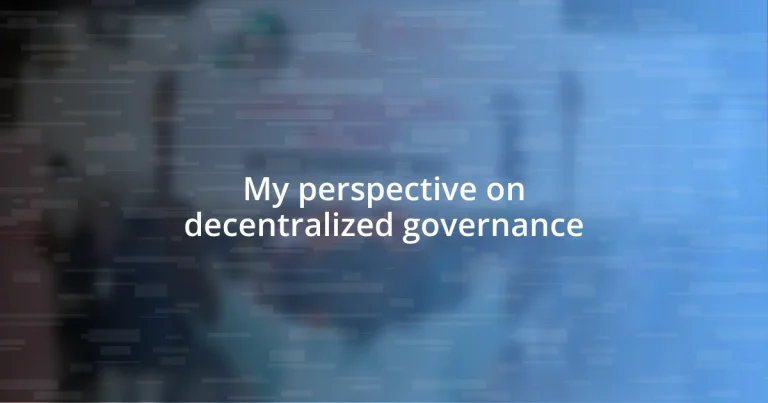Key takeaways:
- Decentralized governance enhances local engagement, accountability, and the ability to tailor solutions to community needs, fostering innovation and participation.
- Key principles include local empowerment, transparency, and adaptability, all essential for building trust and effective governance.
- Challenges such as varying local capacities, conflicting interests, and the need for a cultural shift must be addressed for successful implementation of decentralized governance.
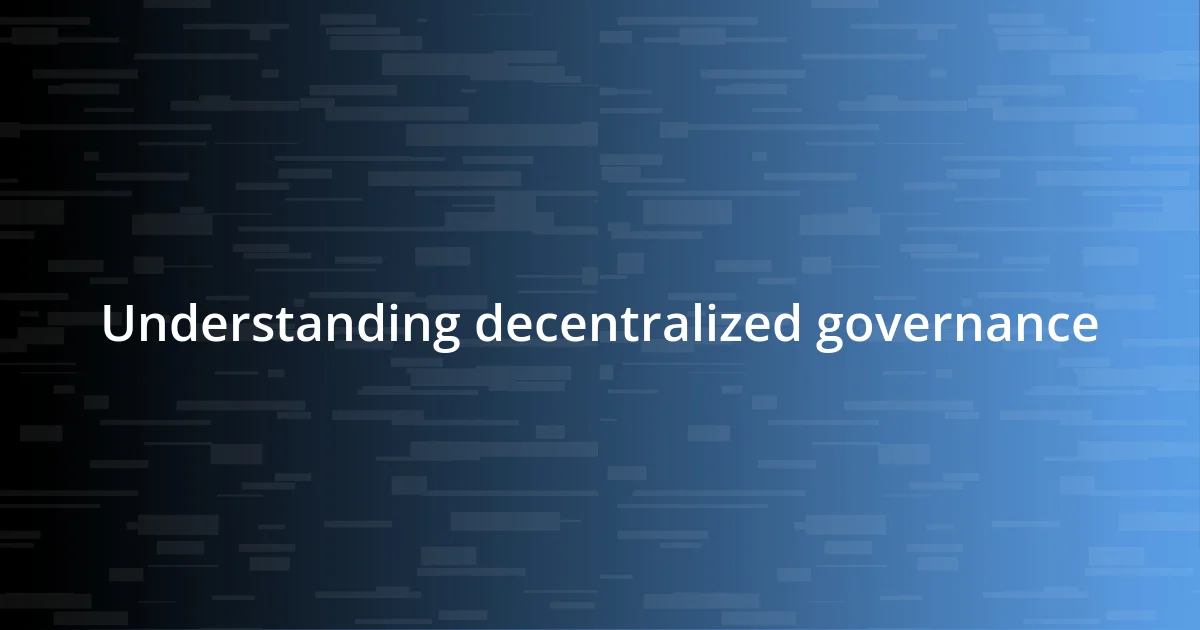
Understanding decentralized governance
Decentralized governance refers to a system where decision-making authority is distributed across various levels rather than being concentrated in a central authority. I remember the first time I encountered this concept during a community meeting; the energy in the room was palpable as everyone had a voice in shaping our local policies. It struck me profoundly—what if more communities operated this way?
In my experience, this approach can lead to greater accountability and responsiveness, as local leaders are more directly connected to their constituents. Think about it: wouldn’t you feel more inclined to engage with governance if you knew your input could directly influence outcomes? I certainly do, especially when I can see tangible results from our collective efforts.
Moreover, decentralized governance often fosters innovation and participation, sparking creativity among individuals who might otherwise feel disenfranchised. I once participated in a project that empowered citizens to propose their own initiatives. Watching diverse ideas blossom into actionable plans left me optimistic about our collective potential. Isn’t it inspiring to think about how shared responsibility can unlock new possibilities?
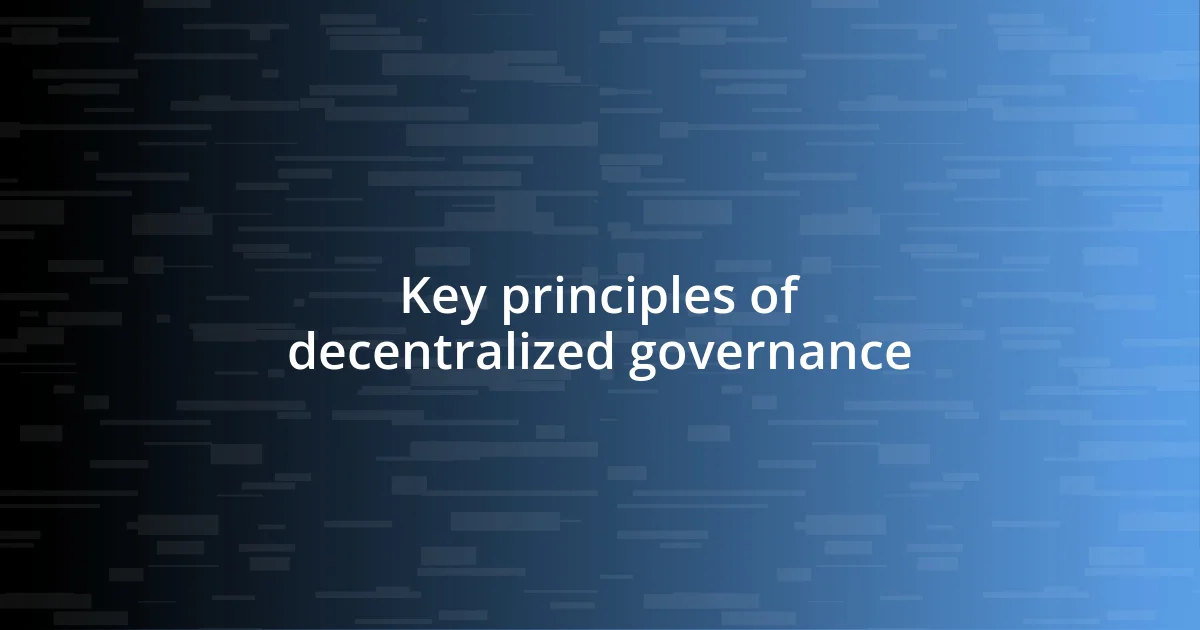
Key principles of decentralized governance
Decentralized governance thrives on the principle of local empowerment. In my own community, I’ve seen how this can lead to decisions that genuinely reflect the needs and desires of residents. For instance, during our neighborhood council meetings, I noticed that when people are given the chance to voice their opinions, they don’t just participate—they invest in the outcomes. It’s like a lightbulb turning on; every voice matters, and that sense of ownership drives engagement.
Another key principle is transparency, which fosters trust in governance. I recall a workshop where community members discussed budget allocations for local projects. The openness of the conversation allowed for constructive feedback and sparked a sense of collaboration among participants. This openness is crucial; without it, how can citizens hold their leaders accountable? I’ve found that when people have the information they need, they feel more equipped to contribute meaningfully.
Lastly, adaptability is essential in decentralized governance. I remember a time when our local initiatives had to pivot due to changing community needs, and that flexibility led to innovative solutions that may not have surfaced in a more rigid system. This ability to respond to circumstances in real-time empowers communities to evolve. It’s a reminder that governance isn’t set in stone; it’s a living, breathing entity that can adapt to better serve its people.
| Key Principle | Description |
|---|---|
| Local Empowerment | Decentralized governance gives authority to local leaders and communities. |
| Transparency | Open communications build trust between citizens and leaders. |
| Adaptability | The ability to respond and evolve based on community needs. |
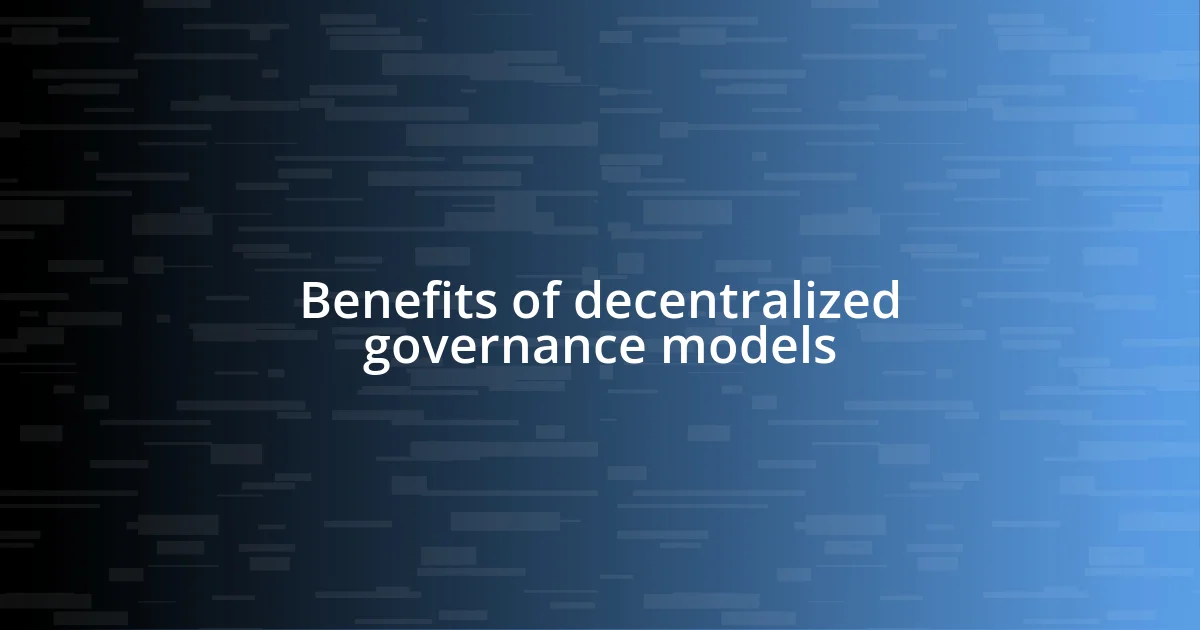
Benefits of decentralized governance models
Decentralized governance brings a wealth of benefits that I find truly transformative. One of the most striking advantages is the enhanced ability for communities to tailor solutions to their unique needs. I recall volunteering at a local initiative where we were tasked with addressing waste management. Unlike a top-down approach, our community brainstormed actionable ideas that reflected our specific challenges. The pride I felt as we implemented those solutions was exhilarating; we weren’t just following orders; we were creators of change.
- Increased local engagement: Residents feel a stronger connection and commitment to initiatives that affect their lives.
- Improved accountability: Leaders are more directly accountable to their communities, making oversight feel immediate and personal.
- Tailored solutions: Locals can identify and tackle issues that might be overlooked by a distant authority.
- Encouragement of innovation: Diverse voices contribute to creative problem-solving that leads to better outcomes.
Furthermore, I’ve witnessed how decentralized governance can significantly boost civic participation. At a town hall meeting, the atmosphere buzzed with excitement as citizens were invited to share their visions for local development. It was uplifting to see shy individuals transform into passionate advocates, challenged by the idea that their thoughts could shape future policies. The tangible shift in atmosphere reminded me that when people are given the reins, they often surprise themselves—and others—with their motivation to contribute.
- Strengthened community bonds: People come together, building a sense of solidarity.
- Enhanced diversity of ideas: Different perspectives fuel richer discussions and solutions.
- Increased satisfaction: When citizens see their contributions acknowledged, it fosters a sense of fulfillment and purpose.
- Greater trust in governance: When outcomes are reflective of local input, trust between leaders and citizens deepens.
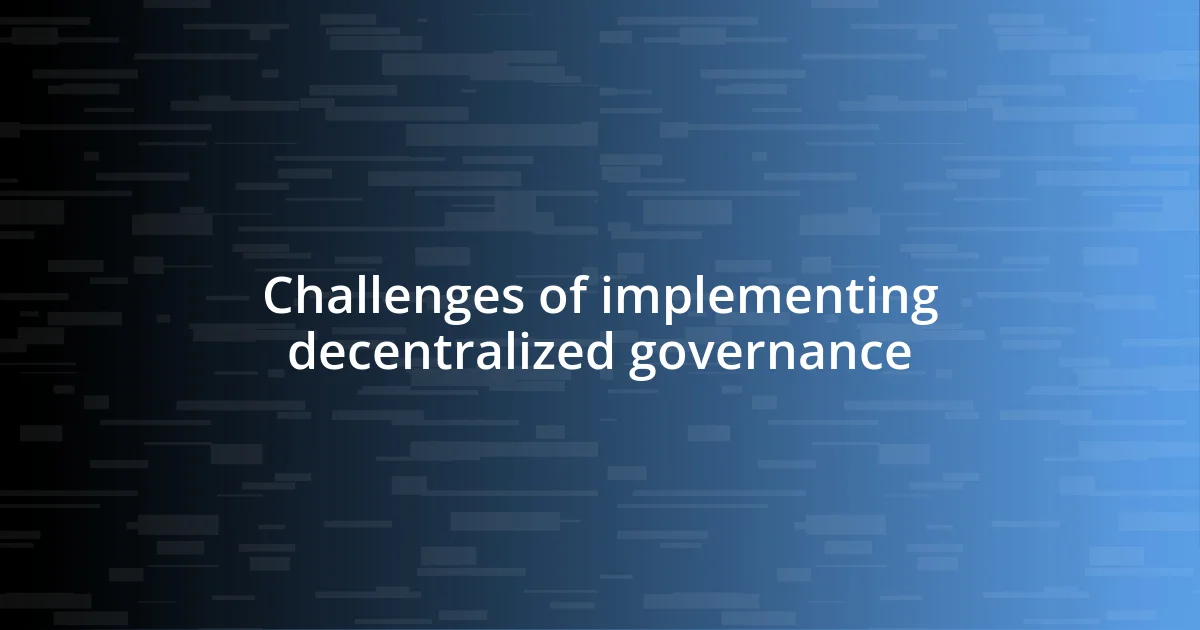
Challenges of implementing decentralized governance
Implementing decentralized governance is not without its hurdles. One significant challenge I’ve experienced is the variance in local capacities. In my community, some neighborhoods thrive with well-organized groups, while others struggle due to factors like lack of resources, knowledge, or engagement. I often wonder: how can we ensure that every voice is heard, especially in places where organization is weak? It’s a delicate balance, and finding ways to empower those less represented is crucial for genuine decentralization.
Another roadblock that I’ve noticed is the potential for conflicting interests among community members. During a local planning session, disagreements about priorities popped up, and it became evident that not everyone shared the same vision. I realized then that fostering a productive dialogue is essential to address differing opinions. How do we navigate those disagreements without discouraging participation? It’s through active listening and mediation that we can create a platform for everyone’s voice while still moving forward together.
Lastly, implementing decentralized governance often requires a culture shift that can take time. I remember when I voluntarily joined a local governance group; the initial resistance from some long-time residents was palpable. They were accustomed to a top-down approach where decisions trickled down without much input. But as trust grew over time, so did their willingness to engage. This is a reminder that patience and persistence are key. Can we transform mindsets about governance not just in our communities, but on a larger scale? It’s a challenge worth tackling as we strive for a more inclusive and participatory future.












